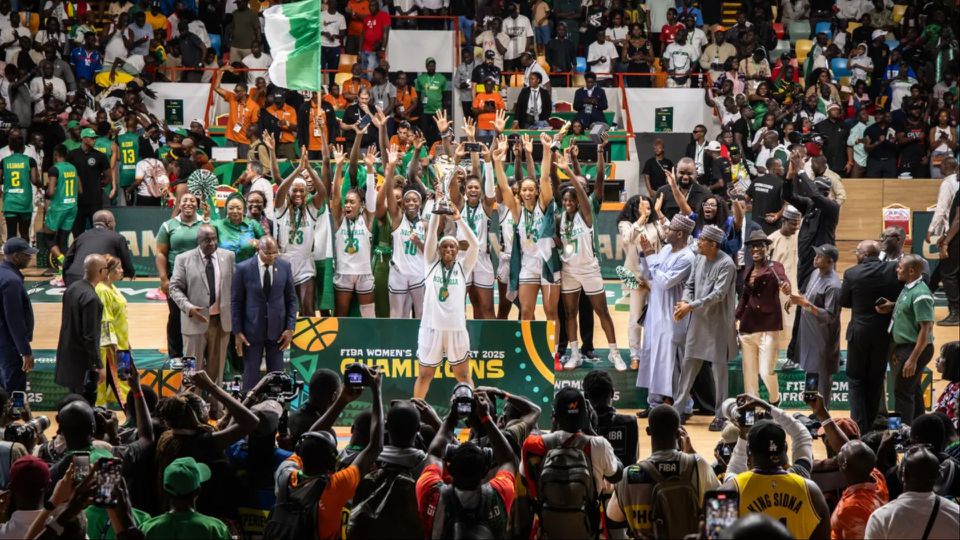There are moments in sports that shape generations and ignite dreams. The FIBA Women’s AfroBasket 2025 Final between Nigeria and Mali will be remembered as one of those rare, defining clashes. When the last whistle echoed through the Palais des Sports de Treichville in Abidjan, Côte d’Ivoire, it signaled not just another victory for Nigeria’s D’Tigress, but the crowning of an African dynasty.
The weight of history and rivalry
This final had the weight of decades behind it. Nigeria and Mali have danced this fierce tango many times since 2011, trading wins, losses, and heartbreak. Coming into the night, they had faced off six times in the Women’s AfroBasket, splitting the tally three apiece since their duel in Bamako. Fans from Abuja to Bamako, and across the continent, knew this would not be just about numbers but about legacy, pride, and unfinished business.
The journey to the final
D’Tigress began their 2025 AfroBasket campaign with authority. Kicking off with a resounding 92-45 win against Rwanda and a hard-fought edge over Mozambique, they topped Group D. Cameroon fell next, outpaced 83-47, before arch-rivals Senegal provided their stiffest test. That semifinal was a gutsy comeback, with the Nigerian side overturning deficits to close out a 75-68 win, extending what would become a stunning 29-game undefeated streak dating back to 2015.
Mali’s path was marked by similar conviction. They took Group B with dominant displays against South Sudan and Cameroon, then overwhelmed Cameroon again in the quarterfinals. Their semi-final, a statement 76-50 rout over South Sudan, set up the mother of all showdowns. Both sides arrived unbeaten, brimming with confidence, and fueled by their historic rivalry.
Clash of titans in Abidjan
In a final that lived up to its billing, Mali struck first. The Malian ladies exploded out of the gate, carving out a 26-21 first-quarter lead, riding on their youthful energy and the inside dominance of Sika Koné, who would finish with an outstanding 24 points. Nigeria found themselves against the ropes but, as so often during their reign, refused to falter.
The second quarter saw D’Tigress respond with composure. Amy Okonkwo, the reigning MVP and the soul of this squad, ignited the comeback, draining key buckets and marshaling her teammates. By halftime, the deficit was erased, and the game was very much alive.
The third act belonged to Nigeria. Ezinne Kalu, ever the floor general, orchestrated the offense with poise and found scoring seams against Mali’s disciplined defense. Nigeria edged ahead with a 20-15 margin in the quarter. Into the fourth, their defensive intensity choked Mali’s rhythm, sealing the deal with a roaring 17-8 finish that sent green and white flags waving.
The human stories inside the numbers
On nights of glory, statistics narrate only part of the story. Yes, Nigeria shot 49 percent from the field compared to Mali’s 37 percent, and their efficiency, especially in the clutch, tilted the scales. But for every field goal, there was a backstory—a player’s journey from local courts to continental heights, families watching anxiously from thousands of miles away, young girls inspired by the fight and fearlessness on display.
For Amy Okonkwo, whose 19 points and 9 rebounds made her a beacon throughout the tournament, the win cements her status among the continent’s elite. Ezinne Kalu’s 20 points and five assists, Promise Amukamara’s orchestrative 11 assists, and the fearless hustle of Victoria Macaulay, each were a testament to what chemistry and belief can deliver.
Mali’s journey too deserves applause. Despite the heartbreak, there is pride in their youthful roster, especially Koné’s double-doubles, Djeneba N’Diaye’s relentless scoring, and a team that will challenge again soon. Their average team age of just 24 signals a vibrant future. This was not defeat, but a signpost on a rising journey.
Building a sporting dynasty
What makes this fifth consecutive AfroBasket crown so profound? It is the consistency of excellence, the ability to retool without losing character, and the silent, patient build-up since Nigeria turned the rivalry tide in 2017. Each edition has had new heroes, but always the same defiant spirit. With Rena Wakama at the helm, the first female head coach to guide Nigeria to back-to-back AfroBasket titles, there is both strength and symbolism in this team’s ascent.
D’Tigress are now not just the most dominant force in African women’s basketball, but a benchmark for all national teams across the continent. Their 29-game unbeaten run in AfroBasket tournaments since 2015 is already the stuff of legend, and with automatic qualification for the 2026 FIBA Women’s Basketball World Cup, the opportunity to inspire on a global stage beckons.
Rivalry and respect between Nigeria and Mali
Part of the richness of this saga is the mutual respect borne through fierce competition. Mali and Nigeria have shared heartbreaks and celebrations, and tonight, while only one could win, both left with admiration intact. Of the eight players from both teams who were on court in the 2021 final, every one was present again. The rivalry is not just in results, but in character and continuity.
The wider impact for African women’s sport
The ripple effect of this victory will be felt across Africa. D’Tigress’s story is one that transcends borders. Each title, every hard-won game, lights new fires in basketball academies, inspires sponsors to invest, and draws crowds in places where women’s sport was once overlooked. The continent’s game is now younger and more unpredictable than ever. From South Sudan’s semi-final breakthrough to Mali’s youth movement and Nigeria’s unyielding run, African basketball’s evolution is gathering pace.
Looking ahead to Berlin and beyond
As Nigeria prepares for the 2026 World Cup qualifying tournament, and Mali resets with dreams of revenge, the legacy of this final is secure. What started as a contest for a trophy ended as a celebration of ambition, resilience, and the power of women at the summit of sport. The journey for all these remarkable athletes continues, and so does the inspiration for the next generation who now have heroes to watch and emulate.
For D’Tigress, lifting that fifth consecutive AfroBasket title was more than a win. It was a message to all of Africa—about what is possible with unity, vision, and relentless drive. As the echoes of celebration fade in Abidjan, the story continues to inspire wherever the love of the game lives.





